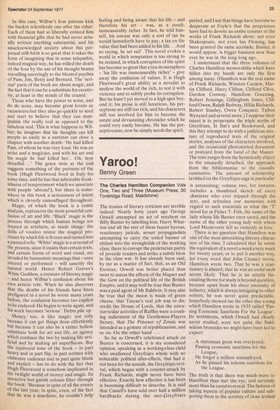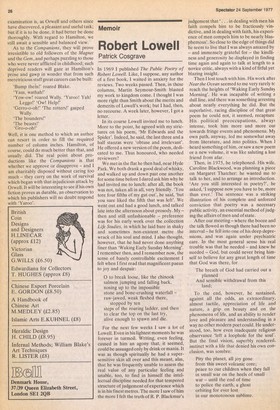Yaroo!
Benny Green
The Charles Hamilton Companion Vois One Two and Three (Museum Press, 30' Tonbridge Road, Maidstone) The ironies of literary criticism are terrible indeed. Nearly forty years ago George Orwell attempted an act of mayhem on Billy Bunter by labelling him, Harry Wharton and all the rest of them fascist hyenas, reactionary jackals, arrant propagandists attempting to carry the soiled banner of elitism into the strongholds of the working class, there to corrupt the proletarian purity of juvenile readers and strike a subtle blow in the class war. It has already been said, by me as a matter of fact, that, as an Old Etonian, Orwell was better placed than most to assess the effects of the Magnet and the Gem on the political life of the British Empire, and it may well be true that Bunter was a paid agent of Mr Baldwin. It may also be true that the moon is made of green cheese, that Tarzan's real job was to discredit the House of Lords, that the extracurricular activities of Raffles were a crushing indictment of the Gentlemen-Players fixture, that The Prisoner of Zenda was intended as a gesture of republicanism, and so on. On the other hand .
So far as Orwell's celebrated attack on Bunter is concerned, it is my considered opinion, speaking as a working-class child who swallowed Greyfriars whole with no noticeable political after-effects, that had it not been for the assault, the Greyfriars revival, which began with a counter-attack by Frank Richards, might never have been effective. Exactly how effective it has been is becoming difficult to describe. It is said that Cassell's have sold over half a million hardbacks during the neo-Oreyfriars period, and I see that things have become so desperate at Foyle's that the proprietors have had to devote an entire counter to the works of Frank Richards alone; not even Shakespeare, not even Ian Fleming, has been granted the same accolade, Bunter, it would appear, is bigger business now than ever he was in the long long ago.
I understand that the three volumes of Charles Hamilton memorabilia which have fallen into my hands are only the first among many. (Hamilton was the real name of Frank Richards, Winston Cardew, Martin Clifford, Harry Clifton, Clifford Clive, Gordon Conway, Hamilton Greening, Robert Jennings, Gillingham Jones, Clifford Owen, Ralph Redway, Hilda Richards, Robert Stanley, Owen Conquest, Talbot Wynyard and several more.) I suppose their intent is to perpetuate the triple myths of Greyfriars, St Jim's and Rookwood, and this they attempt to do with a judicious mixture of reproduced texts of the original stories, analyses of the characters involved, and the occasional photostatted document or postcard from the hand of the Master. The tone ranges from the hysterically abject to the amusedly detached, the approach from the bibliomaniac to the casually ruminative. The amount of scholarship lavished on the Greyfriars saga in particular is astonishing; volume two, for instance, includes a thumbnail sketch of every character who ever tripped through the text, and refreshes our memories with regard to such essentials as what the 'T' stood for in Fisher T. Fish, the name of the lady whose life Bunter once saved, and the name of the other young lady with whom Lord Mauleverer fell so violently in love.
There is no question that Hamilton was one of the most astonishing literary characters of his time. I calculated that he wrote the equivalent of a novel a week every week for twenty years, or to put it another way, for every word that John Creasey wrote, Hamilton wrote two. That he was a reactionary is absurd; that he was an awful snob seems likely. That he is an utterly fascinating theme for study is beyond question, because apart from his sheer enormity of industry, which is always intriguing to other writers, he was never quite predictable. Somebody showed me the other day a song which Hamilton wrote in 1935 called 'Passing Economic Sanctions For the League'. Its sentiments, which Orwell had clearly never studied, were not quite the Baldwinian bromides we might have been led to expect: A statesman great was overjoyed, Passing economic sanctions for the League, He forgot a million unemployed, As he passed his solemn sanctions for the League.
The truth is that there was much more to Hamilton than met the eye, and certainly more than he cared to reveal. The fashion of taking aspects of popular culture and subjecting them to the scrutiny of close textual examination is, as Orwell and others since have discovered, a pleasant and useful task; but if it is to be done, it had better be done thoroughly. With regard to Hamilton, we still await a sensible and balanced view.
As to the Companions, they will prove irresistible to old followers of the Magnet and the Gem, and perhaps puzzling to those who were never afflicted in childhood; such deprived readers will gaze at Hamilton's prose and gawp in wonder that from such meretricious stuff great careers can be built: 'Bump then!' roared Blake.
Yaas, wathah!'
'Yow-ow! roared Wally. `Yaroo! Yah!
Leggo!"Ow! Help!' `Gerro-o-oh!'The rotters!' gasped Wally.
'The bounders!'
'The beasts!'
`Gro-o-oh !'
Well, it is one method to which an author can resort in order to fill the required number of column inches. Hamilton, of course, could do much better than that, and usually did. The real point about productions like the Companions is that whether we approve or disapprove — and I am charitably disposed without caring too much — they carry on the work of survival which began with that injudicious attack by Orwell. It will be interesting to see if his own fiction proves as durable, an observation to which his publishers will no doubt respond with `Yaroo'.



































 Previous page
Previous page